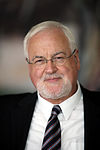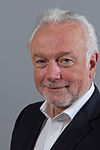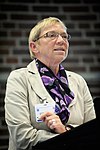The CDU and FDP won a narrow majority of 49 seats (later revised to 48). The CDU therefore chose to enter government with the FDP rather than seek a new grand coalition with the SPD.
Legal challenge against the election result
After the election, a dispute arose regarding the electoral law. In Schleswig-Holstein, the standard size of the Landtag is 69 seats, of which 40 are single-member "direct mandates", and the remaining 29 are distributed based on compensatory proportional representation. German electoral law conventionally seeks to create overall proportionality in legislatures; ie, the ratio of seats distributed between each party should, as closely as possible, match the ratio of votes won between each party.
In the 2009 election, the CDU won a large majority of the 40 direct mandates, meaning it held 11 more seats than was proportional in the 69-seat Landtag. The Schleswig-Holstein electoral law contains provisions to allocate leveling seats in this situation. However, the wording of the electoral law was ambiguous, making it unclear whether 14 or 20 leveling seats should be added. On 16 October, the state returning officer stated that 14 seats should be added. The members of the electoral commission (the state returning officer and six party representatives) subsequently voted on this proposal, with 3 voting in favour, 2 against, and 2 abstentions. The returning officer, CDU, and FDP representatives voted in favour.
The size of the Landtag was therefore set to 95 seats. This left the CDU and FDP with 49 seats (a two-seat majority) while the SPD, Greens, Left, and SSW held 46 seats between them. This was despite the fact that the CDU and FDP had together won 744,950 votes (46.5%), fewer than the other four parties, which together won 772,475 (48.2%). This was because 14 leveling seats were not sufficient to create true proportionality, and the CDU was still overrepresented in the Landtag. If the electoral commission had allocated 20 leveling seats rather than 14, proportionality would have been achieved, and the CDU and FDP would have held 50 out of 101 seats, just short of a majority.
The Greens and SSW sought a legal challenge to the disproportionate result; The Left joined this challenge after the sitting of the new Landtag. The case was heard by the Constitutional Court of Schleswig-Holstein on 28 June 2010. The verdict, announced on 30 August, was that the electoral law was unconstitutional. The court ruled that the law must be changed by 31 May 2011, and a new state election held no later than 30 September 2012. However, the result from the 2009 election was allowed to stand, so the government continued with its majority intact.
A new electoral law was passed by the Landtag on 25 March 2011, and on 7 June, the election date was set for 6 May 2012. [4]







